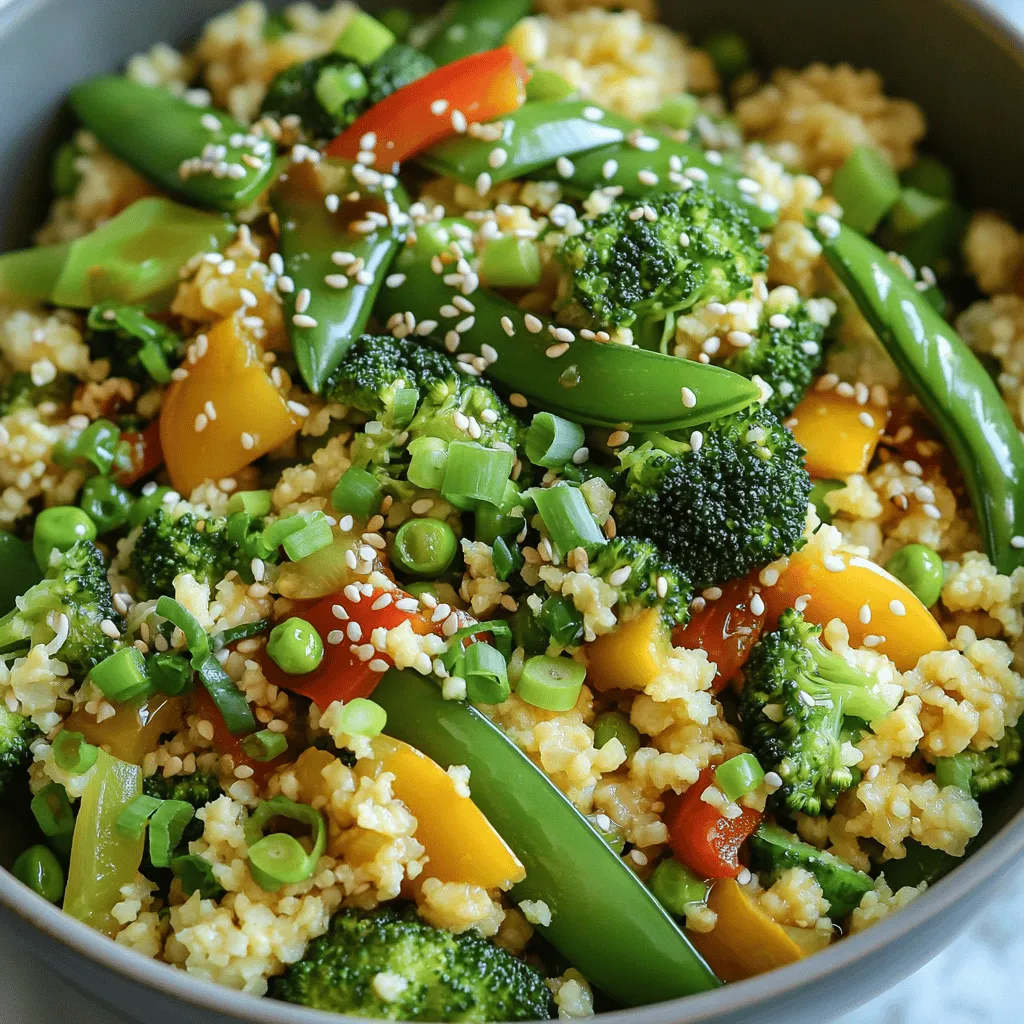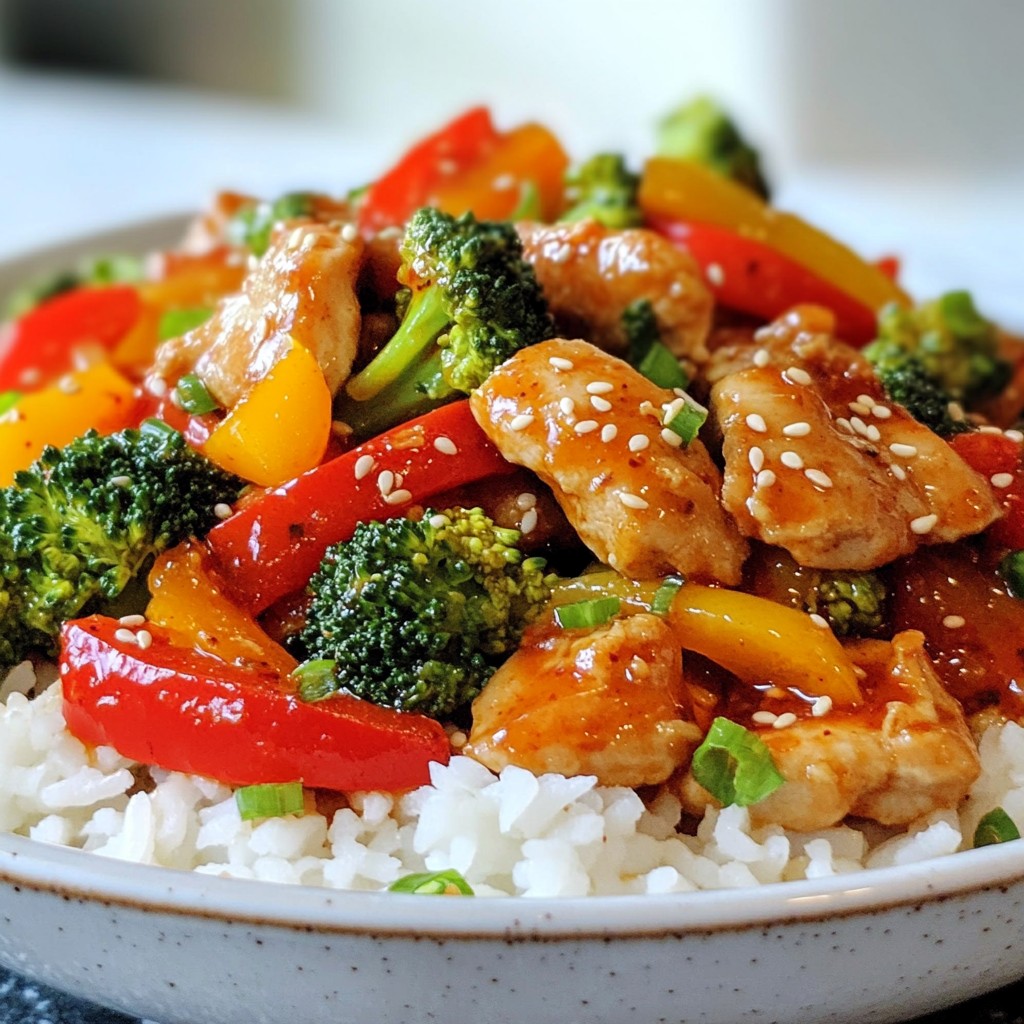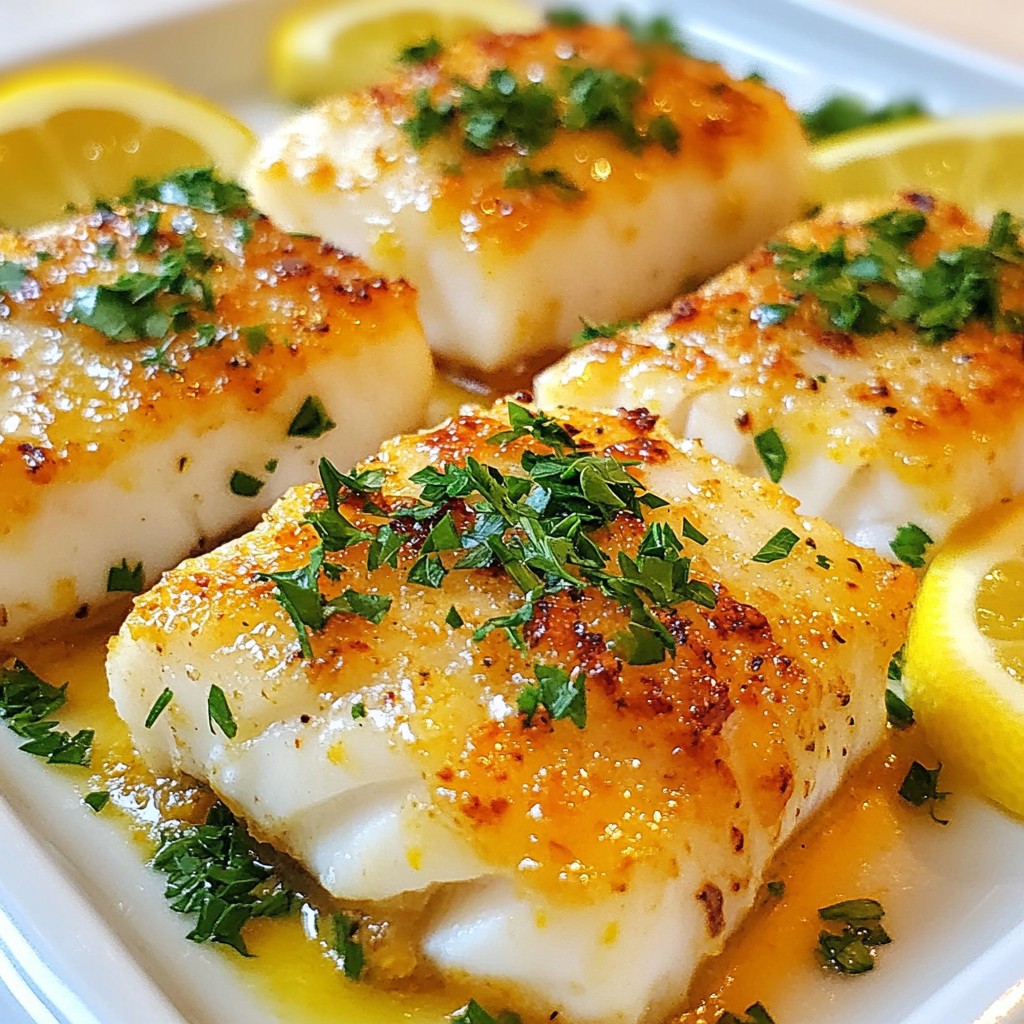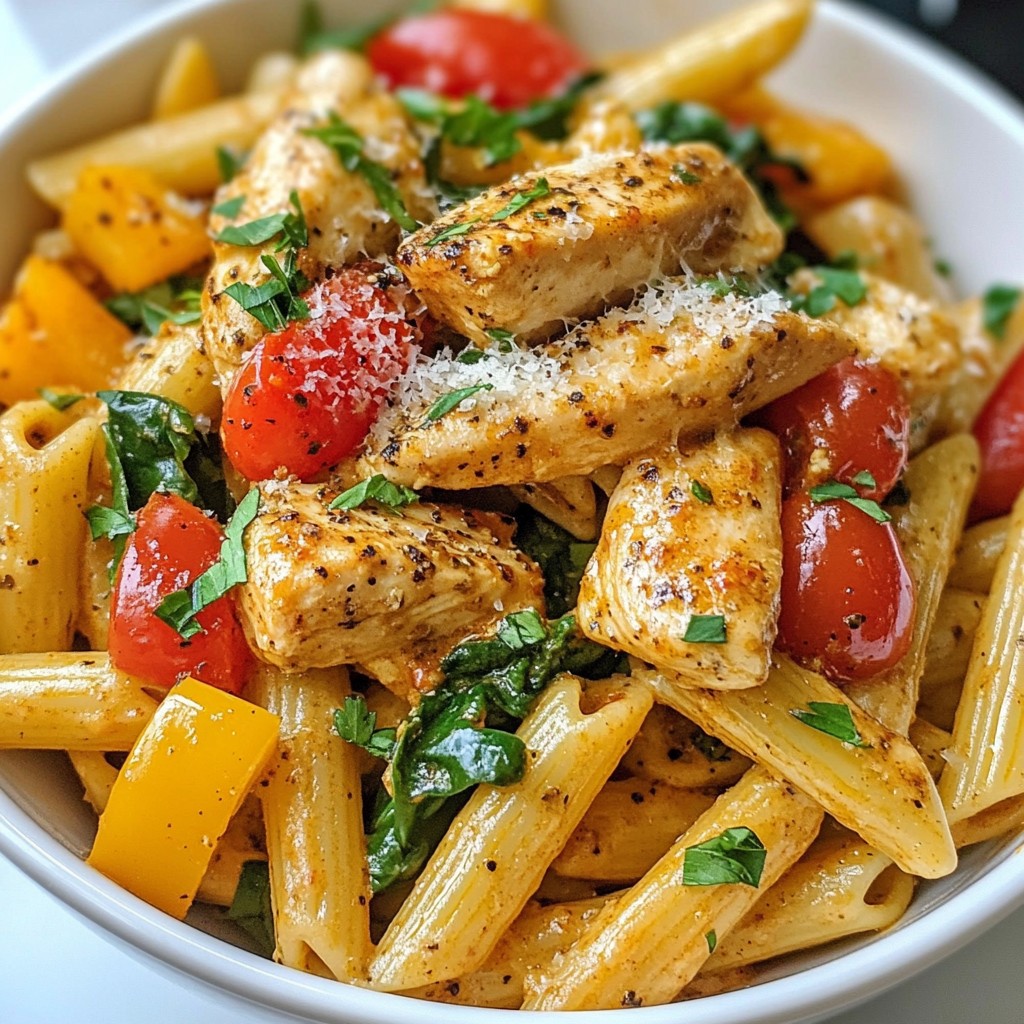Looking for a quick and tasty meal? My Cauliflower Rice Stir-Fry is the answer! This dish is bright, healthy, and packed with flavor. You can whip it up in under 30 minutes. You’ll learn how to prepare easy cauliflower rice and mix it with fresh veggies and spices. Ready to dive into this simple recipe? Let’s turn your kitchen into a flavor-packed paradise right now!
Ingredients
List of Ingredients
– Cauliflower and Vegetables
– 1 medium head of cauliflower, grated to create rice-like pieces
– 1 cup broccoli florets, cut into bite-sized pieces
– 1 bell pepper (red or yellow), diced for vibrant color
– 1 small carrot, julienned for a sweet crunch
– 1 cup snap peas, trimmed and ready to crisp
– Aromatics and Seasonings
– 2 cloves garlic, minced to release aroma
– 1 tablespoon fresh ginger, minced for warmth
– 3 tablespoons soy sauce or tamari (for gluten-free option)
– 1 tablespoon sesame oil for nutty depth
– Oils and Garnishes
– 1 tablespoon olive oil for sautéing
– 2 green onions, finely chopped for garnish
– Sesame seeds for an elegant finish
– Salt and pepper, to taste
Gathering these ingredients is key to a tasty meal. Each veggie adds color and crunch. The garlic and ginger give a warm, spicy note. Soy sauce and sesame oil make the dish savory. Don’t forget the sesame seeds; they add a nice touch!
Step-by-Step Instructions
Preparing the Cauliflower Rice
To start, I take a medium head of cauliflower. I remove the leaves and stem first. Then, I cut it into quarters. Next, I grab either a grater or a food processor. I grate the cauliflower until it looks like rice grains. This process makes the perfect base for my stir-fry. Once done, I set the cauliflower rice aside to use later.
Cooking the Aromatics
Now, I heat a large skillet or wok over medium-high heat. I add one tablespoon of olive oil to the pan. After the oil warms, I toss in two cloves of minced garlic and one tablespoon of fresh minced ginger. I sauté these for about 30 seconds. I want them fragrant, but not burnt. The aroma fills my kitchen and signals that it’s time for the next step.
Stir-Frying the Vegetables
Next, I introduce my colorful veggies. I add one diced bell pepper, one small julienned carrot, one cup of broccoli florets, and one cup of snap peas. I stir-fry this mix for about 3-5 minutes. I watch closely as they cook, ensuring they stay tender yet crisp. This step adds color and nutrition to my dish.
Combining Components
After the vegetables are cooked, I add the cauliflower rice to the skillet. I mix everything together well. This is key to blending the flavors. I let it cook for an extra 4-5 minutes. I stir regularly to avoid sticking and ensure even cooking. This helps achieve a nice texture in my stir-fry.
Final Seasoning and Serving
I then drizzle three tablespoons of soy sauce and one tablespoon of sesame oil over the stir-fry. I toss everything to combine. This step ensures that every bite bursts with flavor. I let it cook for 1-2 more minutes. I then season with salt and pepper to taste. To finish, I add two finely chopped green onions and stir again. I then transfer the stir-fry to a serving dish. I sprinkle sesame seeds on top for a nice crunch and visual appeal.
This simple yet flavorful dish always impresses my family and friends.
Tips & Tricks
How to Enhance Flavor
Using fresh ingredients is key. Fresh veggies bring life to your dish. Look for bright colors and firm textures. They make your stir-fry tasty and eye-catching. Try to pick seasonal produce for the best flavor.
Adjusting seasonings can elevate your stir-fry. Start with soy sauce for umami. You can modify the amount to fit your taste. If you like it spicy, add chili flakes. A splash of lime juice can add brightness. Always taste as you go to find your perfect blend.
Cooking Techniques
Stir-frying is quick and keeps veggies crisp. Use high heat and constant movement. This method locks in flavors and nutrients. Sautéing, while slower, can achieve great results too. Both methods have their place in the kitchen.
Avoiding overcooking is essential. Keep an eye on your veggies. They should be tender yet still have a nice crunch. Overcooking can lead to mushy textures. Remember, you want each bite to be delightful.
Presentation Ideas
Serving suggestions matter. Arrange the stir-fry on a large dish for sharing. For individual bowls, add a scoop of rice on the side. This makes for a complete meal.
Decorative garnishing tips include adding green onions and sesame seeds. A sprinkle of seeds adds a nice texture. A few extra slices of green onion can brighten up the dish. Use these touches to make your meal visually appealing.

Variations
Protein Additions
You can easily add protein to your cauliflower rice stir-fry. Tofu is a great choice if you want a vegetarian option. Just press it to remove excess water, then cut it into cubes. Sauté the tofu until it is golden and crispy before adding it to the stir-fry. This adds a nice texture and flavor.
If you prefer meat, chicken works well too. Cut the chicken into small pieces and cook it in the skillet before adding the veggies. This way, the chicken absorbs the flavors of the garlic and ginger.
You can also try shrimp instead of chicken. Shrimp cooks quickly and brings a tasty twist. Just toss in the shrimp once your veggies are nearly done. Cook until they’re pink and opaque, and you are all set!
Additional Vegetables
Feel free to get creative with your veggies. You can add greens like spinach or kale. Just toss them in during the last few minutes of cooking. This keeps them bright and adds extra nutrients.
Using seasonal produce is another fun idea. In summer, zucchini or bell peppers are great. In fall, you might add sliced mushrooms or carrots. The more colors you use, the more appealing your dish will look.
Flavor Profile Changes
Changing your sauces or oils can transform your dish. If you want something different, try using coconut aminos instead of soy sauce. It gives a sweeter taste and is soy-free.
You can also switch up the oils. Use chili oil for a kick or avocado oil for a milder flavor.
If you like spice, add red pepper flakes or sriracha for heat. For sweetness, try a touch of honey or maple syrup. Mixing sweet and spicy gives your dish a unique flavor that will surprise your taste buds!
Storage Info
Storing Leftover Stir-Fry
To keep your leftover stir-fry fresh, start by cooling it properly. Leave it at room temperature for about 30 minutes. This helps reduce moisture build-up. After cooling, store it in an airtight container. This keeps out air and prevents sogginess.
Reheating Guidelines
When you’re ready to eat, reheating is key. Use a skillet over medium heat for best results. Add a splash of water to keep it moist. Stir gently until heated through. This method helps maintain the texture and flavor of the veggies.
Freezing Options
If you want to freeze the stir-fry, choose a freezer-safe container. A heavy-duty freezer bag works well too. Ensure you remove as much air as possible. To thaw, place it in the fridge overnight. Then, reheat in a skillet to bring back the delicious taste.
FAQs
How to make cauliflower rice from scratch?
To make cauliflower rice, start with a medium head of cauliflower. First, remove the leaves and stem. Cut the head into quarters. Use a box grater or food processor to grate the cauliflower. Keep grating until it looks like rice grains. This process takes about 5 to 10 minutes.
What are the health benefits of cauliflower rice?
Cauliflower rice is low in calories and high in nutrients. It contains fiber, vitamins C, K, and B6. Cauliflower rice helps with digestion and may aid in weight loss. It is also gluten-free and low-carb. This makes it a great option for many diets.
Can I prepare this stir-fry ahead of time?
Yes, you can prepare this stir-fry ahead of time. Cook the veggies and cauliflower rice as usual. After cooking, let it cool completely. Store it in an airtight container in the fridge. It will stay fresh for up to three days. When ready to eat, just reheat in a pan or microwave. This saves time on busy days and keeps meals quick and easy.
This blog post covered how to create a delicious cauliflower stir-fry. We discussed ingredients, preparation, and cooking steps to enhance flavors. I shared tips on improving taste and various ways to customize your dish. We wrapped up with storage advice to keep leftovers fresh.
Stir-frying with cauliflower rice is a fun and healthy choice. You can easily adjust the recipe to fit your tastes. I hope you enjoy trying these ideas in your kitchen!




